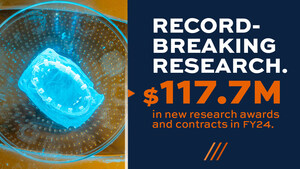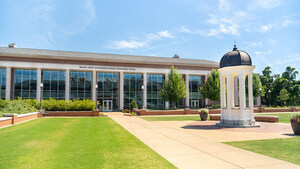Auburn autonomous racing team makes history at Indianapolis Motor Speedway
AUBURN, Ala., Sept. 8, 2021 /PRNewswire/ -- Auburn Engineering's world-renowned autonomous vehicle research program literally lapped the competition — and made history in the process.
Comprised of students in Auburn's GPS and Vehicle Dynamics Lab (GAVLAB), Autonomous Tiger Racing (ATR) was the first to run the Dallara AV-21 autonomous race car around the Indianapolis Motor Speedway (IMS) last month in preparation for the first-ever Indy Autonomous Challenge on October 23.
"Dallara, as an engineering company, has always had a worldwide impact on innovation and technology," said Stefano DePonti, CEO of Dallara USA. "We know the importance of collaborations with universities in continuing to support and grow innovation. We are pleased to learn about Auburn University's recent performance achievement at the track and we look forward to seeing the results as other university teams meet the challenge."
Designed to push the boundaries of autonomous technology, as well as elevate consumer confidence in autonomous vehicles, the Indy Autonomous Challenge will pit teams from around the world head-to-head for 20 laps around the famed 2.5-mile oval at speeds of up to 185 mph.
Top prize? $1 million.
Using LiDAR, GPS-INS, computer vision cameras, radar and other sensors, teams must design a software stack that not only allows an Indy Lights car to travel at race pace but interpret draft influence and the movements of competitors.
Though chase vehicles are employed in testing, cars will soon traverse the track alone. Auburn's pace was limited in its historic, August 27 outing in order to validate track boundaries and to calibrate its software. That will soon change.
"When we start to get to speeds in excess of 130 mph, then we are in uncharted territory," said ATR team lead Will Bryan. "We're looking for how the sensors behave, the quality of the measurements, motion blur in the cameras and lidars. These are higher speeds than many of these sensors have ever been tested with. Then layer in multi-vehicle detection and tracking at high speed — these are the major challenges in front of us."
David Bevly thinks the team can meet them head-on.
"It was exciting to see Auburn's software controlling the vehicle completely autonomously to make history at IMS," said Bevly, Bill and Lana McNair Distinguished Professor and GAVLAB's founder and co-director. "It was incredible to see how quickly the car reacted compared to our chase vehicle. You could really see the software at work."
SOURCE Auburn University-College of Engineering

Related Links
WANT YOUR COMPANY'S NEWS FEATURED ON PRNEWSWIRE.COM?
Newsrooms &
Influencers
Digital Media
Outlets
Journalists
Opted In






Share this article